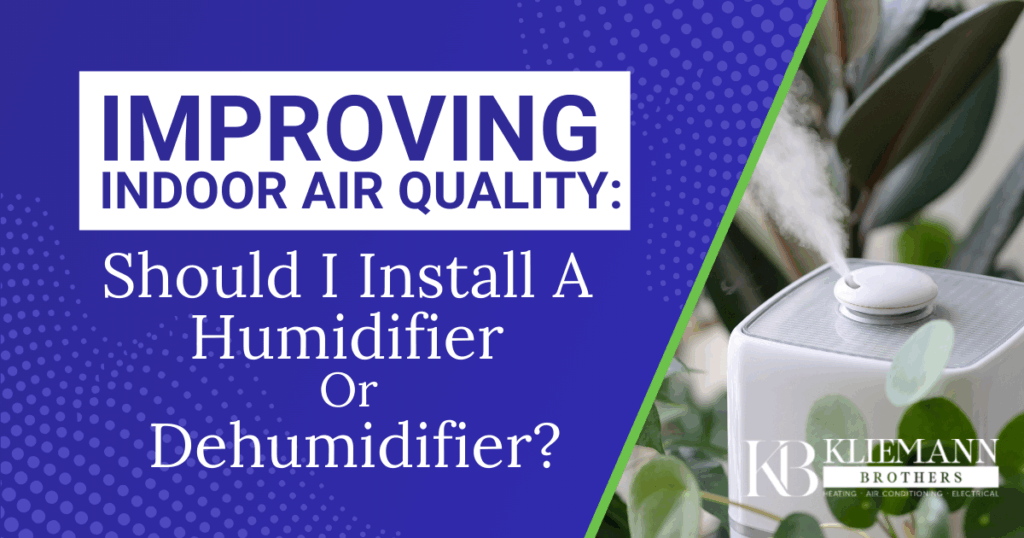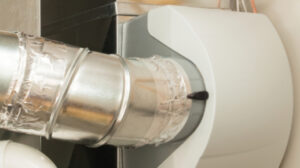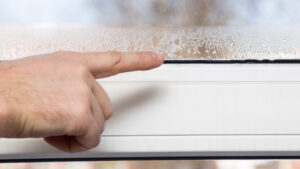Improving Indoor Air Quality: Should I Install a Humidifier or Dehumidifier?

As experts in indoor air quality solutions, one of the most common questions we receive is whether a humidifier or dehumidifier is the right option in a home. The truth is, there’s no single, correct answer to this question — it all depends on your preferences, local climate, and needs. In this guide, we’re covering everything you need to know about humidifiers vs. dehumidifiers, including their benefits, applications, and installation.

The Role of Humidity in Indoor Air Quality
Before we can dive into the pros and cons of whole-house dehumidifier installation or the advantages of humidifiers, we need to understand the benefits of proper humidity in your space as it relates to indoor air quality, or IAQ.
Humidity refers to the amount of water vapor present in the air. It’s measured as relative humidity, or RH, which is expressed as a percentage. Generally, an RH level between 40% and 60% is considered optimal, but this may vary depending on your exact needs and preferences. Humidity has a major impact on your indoor air quality, affecting:
- Comfort: When you have balanced home humidity levels, you avoid uncomfortable issues like dry skin, shocks from static electricity, and eye irritation.
- Respiratory health: Humidity plays a big role in our respiratory health. Overly dry air can irritate our mucus membranes, causing coughs and worsening asthma and allergy symptoms. Likewise, overly humid air worsens allergies and can promote the growth of hazardous mold in the home, which can damage respiratory health over time.
- Property condition: Incorrect humidity levels can also damage your belongings. Overly humid air can damage artwork, furniture, and even your walls and floors as moisture from the air saturates nearby items and structures.
Signs You Might Need a Humidifier
Now that we understand the risks of uncontrolled humidity, it begs the question: Should I use a humidifier or a dehumidifier? We’ll start by looking at the signs that you would benefit from whole-house humidifier installation.
One of the most obvious signs that you need whole-home humidification is if the air in your space feels dry and uncomfortable. You might notice your skin feeling dry and irritated (especially in winter) or receive constant, irritating shocks from static electricity. You may also experience persistent dry coughs or regularly get eye irritation. All of these are signs that it’s time to invest in humidification for your house.
Signs You Might Need a Dehumidifier
How do you know when you need a whole-house dehumidifier? One of the most common signs of poor indoor air quality and humidity is feeling clammy and sticky in your home, even when the air conditioner is running. This is a common signal that your HVAC humidity control is off, meaning you may need to support your system with additional dehumidification.
Other signs that your house is too humid include excessive condensation on the inside of your windows and walls, musty, moldy odors in the home, peeling wallpaper or paint, or worsening allergy and asthma symptoms. Unlike overly dry air, which poses fewer health risks, overly humid air can be a serious problem if left unchecked for too long.

Humidifier vs. Dehumidifier: Which One Is Right for You?
Now that we understand the difference between these two air quality solutions for homeowners, which is the right choice for you? Ultimately, it comes down to your specific needs and preferences.
For example, you might be looking at humidifiers vs. dehumidifiers for allergies. Generally, a dehumidifier is more beneficial for improving respiratory allergy symptoms, as it helps to limit the growth of common irritants like mold and dust mites. But if your allergies are triggered by dry air (or you have asthma), a humidifier might be more useful.
Allergies aren’t the only reason to invest in humidity solutions, though. You might be tired of getting shocked every time you touch doorknobs or light switches. In this case, a humidifier is your friend. But if you’re noticing heavy condensation on the inside of your windows, you’ll need to look into dehumidification before mold and mildew start to grow.
Ultimately, the best humidity level for the home varies. What’s comfortable for one person might be too arid or too humid for another. For this reason, we always recommend working with a professional who can help you determine how to improve indoor air quality in your space.
How Humidity Levels Affect Your HVAC System
It’s not just people who are affected by humidity! Your HVAC system also behaves differently depending on the relative humidity of your space. If it’s too humid, your HVAC systems will have to work harder, as more water needs to be removed from the air to heat or cool it. This can increase energy bills, reduce cooling and heating performance, and even prematurely wear out your HVAC system’s internal components.
However, air that’s too dry can also impact HVAC efficiency, drying out components and causing damage to the system over time. This is why a balanced humidity level is so important for your home.
Professional Installation: Why It Matters
By investing in professional indoor air quality solutions, you ensure that your humidity control system is correctly sized, safely integrated, and expertly installed. An IAQ professional ensures the new system is ready to run efficiently and effectively, helping you prevent respiratory health problems, mold growth, property damage, and excess wear and tear on HVAC systems.

Get Expert Indoor Air Quality Help from Kliemann Bros
If you’re starting to notice a problem with your home’s humidity level, don’t wait to address it. The sooner you get your humidity under control, the sooner you and your family can start breathing easily in your home again. Kliemann Bros is highly experienced in both humidifier and dehumidifier installation, and we can get your indoor air quality to the level you need in a matter of hours. Contact us to schedule an IAQ service appointment!


